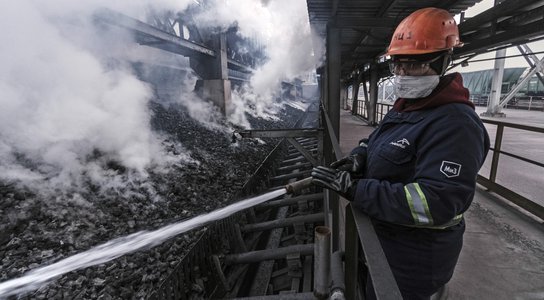When Russia launched its invasion of Ukraine in February 2022, global attention focused on the Russian fossil fuel industry.

With direct military confrontation between NATO and Russia unthinkable, Western nations instead turned to economic sanctions as the primary means to hamper Putin’s war machine. Given the major role which oil and gas exports play in filling the Russian state’s coffers, it seemed a logical next step for Western sanctions to be levelled at this strategically important industry.
Yet, despite their vocal support for the Ukrainian people’s resistance, European governments have proven reluctant to act with any urgency to stop buying Russian fossil fuels. As the war in Ukraine drags on, bringing more death and destruction with each passing day, our leaders are still dragging their feet.
The debate surrounding this issue is often difficult to follow, full of highly technical information and economic and diplomatic jargon. This serves to obscure the simple moral choice which stands before Western leaders: to further fund conflict, or to support the cause of peace. To help demystify this topic, we’ve broken down some of the more common questions we’ve seen below:
How much of the world's oil comes from Russia?
Russia is the world’s largest oil exporter. Before the war, most of its oil – 60% – went to Europe, and 20% went to China.
How much oil and gas do the US and Europe get from Russia?
In 2021 Russia supplied 45% of Europe’s gas, although supplies began to drop near the end of the year. A third of Europe’s oil comes from Russia.
In 2021, the US did not import significant quantities of oil or gas from Russia. The US did import some specialised petroleum products like crude oil from Russia, and the country provides 20% of US imports of such products. The US embargo on Russian fossil fuels will prevent the import of these specialised products (more on this below).
What is the difference between sanctions and an embargo?
Sanctions and embargoes are closely linked. Both refer to trade restrictions that are placed on countries by governments as punishment for crimes and violations. The difference between the two lies in how comprehensive they are.
A sanction is a partial prohibition and can take the form of restricting trade with particular companies, prohibiting travel and financial dealings with certain individuals. An embargo refers to a full prohibition on a particular kind of trade with another country. You can think of an embargo as a powerful sanction.
How would sanctions on Russian oil and gas work?
One type of sanction would involve passing laws prohibiting doing business with specific Russian companies which are known to be funding the Russian war effort. For example, the EU has forbidden transactions with state-owned energy companies Gazprom-Neft and Rosneft.
A more
comprehensive example is the total embargo announced
by the US on the direct import of Russian oil, gas, and coal. This will prevent
Russia from directly exporting any of these goods to the US. The EU has
introduced an embargo on Russian coal, but has fallen short of including oil
and gas too. While they recently agreed to a partial embargo on Russian oil,
the restrictions will not take effect until early 2023.
Are Western sanctions on Russian fossil fuels working?
It’s difficult to say whether the Western energy sanctions regime is working as it is, for the most part, non-existent. The US is currently the only country to have a full embargo on all Russian fossil fuels, and it wasn’t a significant customer to begin with.
Europe as a region is much more dependent on imports of oil and gas from Russia, and has been much slower to follow up its expressions of solidarity with action on fossil fuels. In fact, as things stand it will be completely legal to import Russian oil into the EU and UK until at least December – ten months after the invasion of Ukraine began.
Only a full embargo on Russian fossil fuels can ensure that European consumers aren’t financing Putin’s war through their fuel and energy bills.
Are companies quitting Russian oil and gas of their own accord?
In a word: no. Where companies have taken a step back from Russian fossil fuels, it is usually a result of public pressure from bad headlines in the press. Many fossil fuel companies have been very outspoken in their support for Ukraine and their condemnation of the Russian invasion, yet have quietly continued buying (and even in some cases producing) the Russian oil and gas which made that invasion possible. This practice is sometimes referred to as ‘peace-washing’.
For example, French energy giant Total released a statement in March expressing its solidarity with the Ukrainian people. Yet mere days later it confirmed that it wouldn’t be withdrawing from its Russian liquefied natural gas projects unless the EU introduced further sanctions.
That same month, the chief executive of German energy company Wintershall stated that the ‘Russian President's war of aggression against Ukraine has shaken the foundations of the company’s work in Russia to the core.’ So shaken, in fact, that in the first six months of 2022, the company piped €14 billion worth of Russian gas across Germany and made €400 million from its Siberian gas and oil fields in the first three months of the year.
There are many other similar examples. This is why it’s so important that governments strengthen their sanctions on Russian fossil fuels, so we don’t have to rely on individual companies to choose to do the right thing.
Should Europe and the US look to buy their oil and gas from other oil-producing countries?
While changing your gas supplier at home is relatively simple, the same can’t be said for switching suppliers at the international level. The reason for this is that gas can’t simply be loaded into shipping containers and transported via normal supply routes. It requires specialised infrastructure such as pipelines and shipping terminals that take a lot of time and money to build. Therefore buying gas from elsewhere wouldn’t be a short-term fix, but a long-term investment.
This would risk repeating the same mistake that was made with Russia by becoming locked into energy dependency with countries that harm their citizens or neighbours. Two of the main countries from which the US and European countries have sought to replace Russian fossil fuels – Venezuela and Saudi Arabia – also have poor humanitarian and human rights records.
The war in Ukraine doesn’t exist in isolation, but must be seen alongside other issues such as the climate crisis. There’s little point investing in new fossil fuel infrastructure when, in order to stay within our international climate commitments, that infrastructure will need to be phased out in a matter of years. This is money better spent on energy we can actually use, like solar and wind, and improving the energy efficiency of our homes and industries.
How quickly can countries transition to renewables?
According to the think tank Carbon Tracker, the world can switch from fossil fuels to renewables to generate all the electricity we need by 2035. By 2050, we can switch from fossil fuels for all of our energy needs. This is because the costs renewable energy sources like wind and solar have fallen dramatically and their use is growing rapidly.
By contrast, constructing new oil and gas infrastructure would lock us into fossil fuel dependence for decades. For the sake of peace, human rights and the climate, governments should seize this moment to fast-track the clean energy transition.

